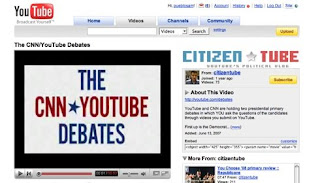The FCC anticipates increasing concerns in 2008 over video news releases which don't identify the source of the information. The issue involves public relations efforts that send video news releases to television stations packaging some promotion about a brand within the guidelines of a traditional news release.
The information should be truthful and informative or the television station isn't likely to air it and it looks to the viewer like a regular news story.
Okay, I'm admitting my PR bias and I'm going to explain why this isn't such a big deal.
"A new diabetes drug is on the market," the local anchor says..."Here's Jane Doe with some background." Then a video airs in which Jane talks about a new drug for diabetes, providing lots of information on its benefits to the sufferer. The information is truthful...the information is helpful to people who suffer from diabetes.
What the information isn't...is produced at that station. In fact, such information may be created by the diabetes drug manufacturer by a public relations team. The VNR promotes the new drug...so its sells...television stations get some good video on a newsworthy topic...the consumer gets helpful information.
Everybody's happy, right?
Not the FCC. The FCC believes the consumer should be told that the VNR is FROM the DRUG COMPANY. The argument behind this is the FCC believes the consumer should know when the information they're accessing is promotional to help the brand and its reputation, rather than the impartial views of a television journalist.
We've been reading news releases for decades from newspapers which don't identify that the news came from a source other than the newspaper. Print news releases are sent to newspapers daily with informative content of interest to the paper's readers.
CSU-Pueblo sends news releases out daily about all the important happenings at the university. The Chieftain staff and the local television and radio station staffs can't possibly come up here and cover all the news we've got to share on a daily basis. It's not LOGISTICLY POSSIBLE. CSU-Pueblo wouldn't get much coverage if the reporter had to personally come up here each time and write each individual story.
When you see a reporter's byline in a newspaper, it identifies the primary writer on the story. When you don't see a byline on a story, it could be because there were multiple authors...or it was a news release from the organization upon which the content is based.
It's standard protocol...it helps the media...as long as the content is accurate and truthful. What is the benefit of identifying every news release that comes into the paper or television station? If the media did, you might be surprised at how much of your news is generated by news releases. There's no other way to get newsworthy information to television and newspapers with such small journalist staffs.
The question is: Does this bother you as a consumer of news?




